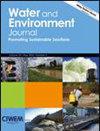Perspectives on multi‐benefit water reuse systems: A confluence of water and wastewater management planning
IF 1.8
4区 环境科学与生态学
Q4 ENVIRONMENTAL SCIENCES
引用次数: 0
Abstract
The multiple benefits of water reuse have yet to be fully realized in our urban water management systems. One pathway to optimal implementation is to plan for their integration with wider assets in water resource or drainage and wastewater management plans. This paper explores the perspectives of water resource and wastewater management planners. Qualitative data was gathered from a workshop organized by the Chartered Institution for Water and Environmental Management (CIWEM) with 25 participants from England's Water Service Providers (WSPs), regulators (Ofwat and the Environment Agency) and consultants working within the UK water sector. The participants acknowledged that water reuse is relevant to both water resource and drainage and wastewater management planning, but that current regulatory and funding frameworks are constraining effective engagement between water resource and drainage and wastewater management planners by encouraging the development of separate plans. A general consensus of the participants was that it would be beneficial to include water reuse technology within current and future Water Resource Management Plans (WRMPs) and Drainage and Wastewater Management Plans (DWMPs). Participants suggested this could be developed through collaborative working partnerships and support from regulatory and funding frameworks that allow for the growth and development of innovative technologies and nature‐based solutions. Participants also highlighted a stronger economic case could be made for water reuse technologies if the approach seeks to capture the wider benefits and not only the ‘best value’ solution. Societal acceptance and the availability of good quality data will be key to the successful adoption of any incentivized water reuse schemes.多效益水回用系统的观点:水和废水管理规划的融合
在我们的城市水管理系统中,水再利用的多重好处尚未充分实现。实现最佳实施的一个途径是将其与水资源或排水和废水管理计划中更广泛的资产相结合。本文探讨了水资源和废水管理规划者的观点。定性数据是从水与环境管理特许学会(CIWEM)组织的研讨会上收集的,25名参与者来自英国水务服务提供商(wsp)、监管机构(ofwater和环境局)和英国水务部门的顾问。与会者承认,水回用与水资源、排水和废水管理规划都相关,但目前的监管和资助框架鼓励制定单独的计划,限制了水资源、排水和废水管理规划者之间的有效参与。与会者的普遍共识是,将水再利用技术纳入当前和未来的水资源管理计划(WRMPs)以及排水和废水管理计划(DWMPs)是有益的。与会者建议,这可以通过协作工作伙伴关系以及监管和供资框架的支持来实现,从而促进创新技术和基于自然的解决方案的增长和发展。与会者还强调,如果这种方法寻求获得更广泛的利益,而不仅仅是“最具价值”的解决方案,那么水再利用技术可以有更强的经济案例。社会的接受和高质量数据的可用性将是成功采用任何奖励性水再利用计划的关键。
本文章由计算机程序翻译,如有差异,请以英文原文为准。
求助全文
约1分钟内获得全文
求助全文
来源期刊

Water and Environment Journal
环境科学-湖沼学
CiteScore
4.80
自引率
0.00%
发文量
67
审稿时长
18-36 weeks
期刊介绍:
Water and Environment Journal is an internationally recognised peer reviewed Journal for the dissemination of innovations and solutions focussed on enhancing water management best practice. Water and Environment Journal is available to over 12,000 institutions with a further 7,000 copies physically distributed to the Chartered Institution of Water and Environmental Management (CIWEM) membership, comprised of environment sector professionals based across the value chain (utilities, consultancy, technology suppliers, regulators, government and NGOs). As such, the journal provides a conduit between academics and practitioners. We therefore particularly encourage contributions focussed at the interface between academia and industry, which deliver industrially impactful applied research underpinned by scientific evidence. We are keen to attract papers on a broad range of subjects including:
-Water and wastewater treatment for agricultural, municipal and industrial applications
-Sludge treatment including processing, storage and management
-Water recycling
-Urban and stormwater management
-Integrated water management strategies
-Water infrastructure and distribution
-Climate change mitigation including management of impacts on agriculture, urban areas and infrastructure
 求助内容:
求助内容: 应助结果提醒方式:
应助结果提醒方式:


